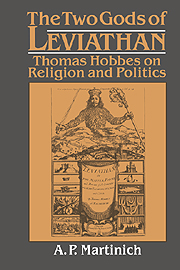Book contents
- Frontmatter
- Contents
- Acknowledgments
- A note on references
- Dedication
- INTRODUCTION
- PART I THE RELIGIOUS BACKGROUND TO HOBBES'S PHILOSOPHY
- PART II LAW, MORALITY, AND GOD
- Chapter 3 POWER, OBLIGATION, AND JUSTICE
- Chapter 4 LAW
- Chapter 5 THE HISTORY AND IDEA OF COVENANTS
- Chapter 6 SOVEREIGN-MAKING COVENANTS
- PART III RELIGION WITHIN THE LIMITS OF SCIENCE AND POLITICS
- Conclusion
- Appendix A Curley on Hobbes
- Appendix B Skinner on Hobbes
- Appendix C The frontispiece to Leviathan
- Notes
- Bibliography
- Index
Chapter 5 - THE HISTORY AND IDEA OF COVENANTS
Published online by Cambridge University Press: 30 December 2009
- Frontmatter
- Contents
- Acknowledgments
- A note on references
- Dedication
- INTRODUCTION
- PART I THE RELIGIOUS BACKGROUND TO HOBBES'S PHILOSOPHY
- PART II LAW, MORALITY, AND GOD
- Chapter 3 POWER, OBLIGATION, AND JUSTICE
- Chapter 4 LAW
- Chapter 5 THE HISTORY AND IDEA OF COVENANTS
- Chapter 6 SOVEREIGN-MAKING COVENANTS
- PART III RELIGION WITHIN THE LIMITS OF SCIENCE AND POLITICS
- Conclusion
- Appendix A Curley on Hobbes
- Appendix B Skinner on Hobbes
- Appendix C The frontispiece to Leviathan
- Notes
- Bibliography
- Index
Summary
In Chapter 2, I argued that from the very beginning of Leviathan Hobbes's thought is steeped in a biblical understanding of humans and nature. In Chapters 3 and 4, I argued that Hobbes subscribes to a divine command theory of morality, according to which the laws of nature consist of two elements: the command of God and propositions about self-preservation. Because these are laws of nature, not special revelation, the only way they could be promulgated by God is through human reason. That is, humans are informed of God's law by reasoning about what it would contain. God is an essential component of the moral laws, according to Hobbes, because laws involve obligation and the only person with the irresistible power necessary to create obligation is God. To put this the other way round, if God did not exist, then no being would have the power necessary to serve as the source for the obligation required for moral laws. The laws of nature could still be deduced by reason, but then they would be only prudential maxims, just as many scholars think they are for Hobbes. But I have argued that Hobbes considers the laws of nature to be genuine moral laws and that he believes they have this character because the almighty God commands them. So, according to Hobbes, the existence of God is essential to morality.
Although the laws of nature operate in the state of nature, they are not sufficient to guarantee human preservation.
- Type
- Chapter
- Information
- The Two Gods of LeviathanThomas Hobbes on Religion and Politics, pp. 136 - 160Publisher: Cambridge University PressPrint publication year: 1992



